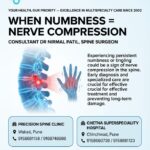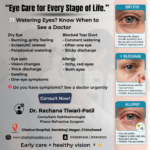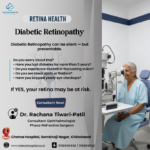Lower back pain is one of the most common health problems affecting people of all ages. Whether you’re a working professional, a homemaker, or an elderly individual, chances are you’ve experienced some form of back pain at some point in your life. In fact, studies show that nearly 80% of adults suffer from lower back pain at least once during their lifetime.
While most cases are temporary and resolve on their own, chronic or severe back pain could signal an underlying spine problem that needs medical attention. This article explores the common causes, symptoms, and treatment options for lower back pain and highlights when it’s time to consult a spine specialist.
What is Lower Back Pain?
The lower back, also known as the lumbar spine, supports most of the upper body’s weight and is responsible for flexibility and movement. It consists of bones (vertebrae), discs, muscles, ligaments, and nerves. When any of these components are injured or degenerate over time, it can lead to pain in the lower back region.
Lower back pain may be:
- Acute: Short-term pain that lasts a few days to weeks.
- Chronic: Persistent pain lasting for more than three months.
Common Causes of Lower Back Pain
Lower back pain can result from injuries, mechanical problems, or medical conditions. Here are some of the most common causes:
1. Muscle or Ligament Strain
Lifting heavy objects improperly, sudden awkward movements, or overuse can strain the muscles and ligaments in your lower back, leading to pain and stiffness.
2. Poor Posture
Prolonged sitting, slouching at a desk, or using an unsupportive mattress can put excess pressure on the spine, resulting in chronic discomfort.
3. Herniated or Bulging Disc
Spinal discs act as cushions between vertebrae. When a disc bulges or ruptures, it can press against nearby nerves, causing pain, numbness, or tingling that radiates to the legs (sciatica).
4. Degenerative Disc Disease
As we age, the discs between our spinal bones can wear down. This degeneration can reduce flexibility and cause painful friction between vertebrae.
5. Spinal Stenosis
This is a narrowing of the spinal canal, often due to age-related changes, that can compress nerves and cause back and leg pain, especially while walking or standing.
6. Arthritis
Osteoarthritis in the spine can lead to inflammation and stiffness. It may also result in the formation of bone spurs, which can press on spinal nerves.
7. Spondylolisthesis
This condition occurs when a vertebra slips out of place over the one below it, potentially compressing nerves and causing lower back pain.
8. Infections or Tumors (Rare)
In rare cases, infections like osteomyelitis or spinal tumors may be responsible for persistent lower back pain.
Symptoms to Watch Out For
Lower back pain can vary in intensity and may be accompanied by other symptoms, such as:
- Dull, aching pain in the lower back
- Sharp or stabbing pain that worsens with movement
- Stiffness and reduced range of motion
- Pain that radiates to the hips, buttocks, or legs
- Tingling, numbness, or weakness in the legs (sciatica)
- Difficulty standing up straight or walking
- Pain that worsens after prolonged sitting or standing
When to See a Spine Specialist
While mild back pain often improves with rest and basic home care, there are signs that indicate a serious underlying condition. You should consult a spine specialist if:
- Pain persists for more than 2–3 weeks
- Pain radiates to your legs, especially below the knee
- You experience numbness, tingling, or muscle weakness
- Back pain interferes with sleep or daily activities
- You have difficulty controlling your bladder or bowel movements (medical emergency)
- You’ve had a recent injury, fall, or accident
At Chetna Multispeciality Hospital, Chinchwad, our experienced Orthopaedic Spine Surgeon – Dr. Nirmal Patil – specializes in diagnosing and treating complex spinal conditions using the latest techniques, including minimally invasive endoscopic spine surgeries.
Diagnosis of Lower Back Pain
To determine the root cause of your pain, your doctor may perform:
- Physical Examination: To assess mobility, reflexes, and signs of nerve compression.
- Imaging Tests:
- X-rays – To detect bone problems like fractures or arthritis
- MRI or CT scan – To evaluate soft tissues, discs, and nerve compression
- Nerve studies – To measure nerve function and identify conditions like sciatica
Treatment Options
Treatment depends on the severity and cause of your back pain. Options may include:
1. Conservative Management
- Rest and activity modification
- Physical therapy and core-strengthening exercises
- Pain relief medications (NSAIDs, muscle relaxants)
- Posture correction and ergonomic changes
2. Minimally Invasive Procedures
If conservative methods fail, options like Endoscopic Lumbar Laminotomy or Discectomy may be recommended. These are daycare surgeries that offer quick recovery and minimal scarring.
3. Surgical Intervention
For severe conditions like spinal instability or disc degeneration, surgery may be needed to relieve pressure on nerves or stabilize the spine.
Preventing Lower Back Pain
Here are a few tips to keep your spine healthy and avoid back pain:
- Maintain good posture while sitting and standing
- Use a supportive chair and mattress
- Avoid lifting heavy objects improperly
- Exercise regularly, especially core-strengthening workouts
- Stay active and maintain a healthy weight
- Take frequent breaks if sitting for long periods
Conclusion
Lower back pain is a common issue, but when it becomes persistent or severe, it shouldn’t be ignored. Identifying the cause early and seeking the right treatment can help you return to a pain-free, active life.
If you’re experiencing continuous back pain, consult with a spine specialist to get an accurate diagnosis and a customized treatment plan. At Chetna Multispeciality Hospital, we offer expert care, advanced diagnostics, and minimally invasive spine procedures to ensure the best outcomes for our patients.
For Consultation Contact us on 9158680739 / 9158681123
Website - www.chetnahospital.co.in
Address – Chetna Hospital, Sambhajinagar, MIDC, G Block, Near Rotary Club, Chinchwad 411019
.
.
.
#pune#pcmc#chinchwad#hospital#medical#medicalservices#spinesurgeon#backspecialist#sciatica#sciaticnerve#sciaticapain#sciaticatreatment#spinesurgery#spinespecialist#spinedoctor#backpaindoctor#endoscopicspinesurgery#orthopaedicsurgeon#mistlifsurgery#cervicalpain#spinalcord#rediculopathy#backpainrelief#slippeddisc#spine#neckpain#spinalstenosis#lumberlordosis#backbonesurgery













